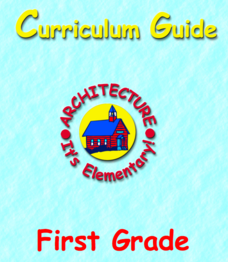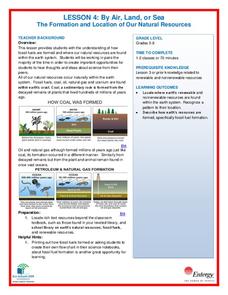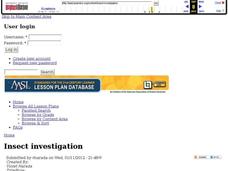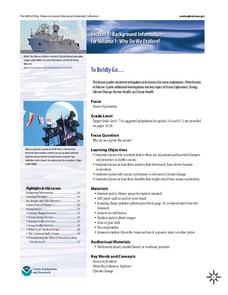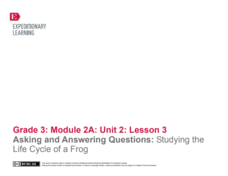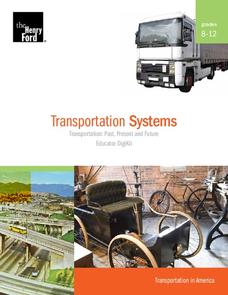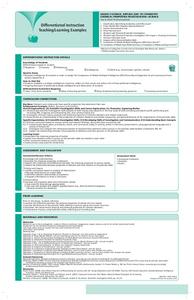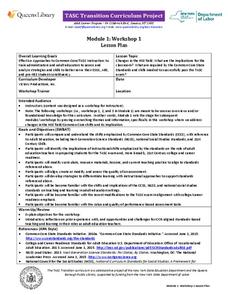Scholastic
Lesson One: The Earth, Background and Glossary
How much do you really know about our planet? Middle schoolers build up their prior knowledge about Earth, its placement in the solar system, its composition, and important geological vocabulary with an introductory earth science...
American Institute of Architects
Architecture: It's Elementary!—First Grade
Build an interest and appreciation for architecture in your young learners with this fun 10-lesson art unit. Engaging children in using their five senses, the class first observes the environment around them, paying...
Curated OER
Exploring Arizona's Biotic Communities Lesson 3: A Day in the Life
Junior ecologists examine Arizona's biotic communities and research an animal or plant that is found in this community. In this lesson, learnerss write a narrative essay about their assigned animal or plant. They research online and in...
National Park Service
News Bearly Fit to Print
There are an average of three human fatalities by bears in North America every year, which is low when you compare it to the 26 killed by dogs and the 90 killed by lightning annually. The lesson encourages researching human-bear...
American Chemical Society
Natural Resources and Synthetic Materials
All synthetic materials began as natural materials. An engaging lesson begins with a hands-on activity and an example of the type of research that scholars perform independently. Then pupils receive a topic and begin researching the...
Scholastic
Ready to Research Owls
Researching facts about owls can be a hoot for your class. Let them wisely collaborate on this writing project. The resource is the second part of three parts. It is best to use all three lessons in order.
Curated OER
Animal Habitats: 1st Grade
Learning about animal habitats can be a lot of fun. This lesson focuses on how God created different habitats to suit different animal needs. Students will conduct library research in order to create a five page habitat slide show using...
Cornell University
Light Waves: Grades 9-12
Explore the behavior of light waves with a lab activity. Scholars build new vocabulary through experimentation and observation. Using different mediums, they model reflection, refraction, transmission, diffusion, and scattering of light.
North Carolina Museum of Natural Sciences
Weather Watch Activity Guide: Groundhog Day
Exactly what do groundhogs know about weather? Not as much as your science students will after completing these lessons and activities that cover everything from the earth's rotation and the creation of shadows, to cloud...
Curated OER
Magic School Bus: The Wild Whale Watch Lesson Plan
Students research information about whales. In this early childhood lesson plan, students create an illustration of a whale to display in a sea scene in the classroom. Students then use the library and internet to research a whale of...
National Wildlife Federation
By Air, Land, or Sea: The Formation and Location of Our Natural Resources
Coal forms from the ancient remains of plants that were alive on Earth before the dinosaurs! Scholars use their t-charts from the previous lesson over resources and research to determine if their information is correct. Through analysis...
Curated OER
Insect Investigation
Investigation is a brilliant way to spark scientific inquiry. First graders will identify, research, and report what they have learned about a mysterious bug found on the playground. They will use multimedia resources for research and...
NOAA
To Boldly Go...
When we think of ocean exploration, many of us have visions of sunken pirate ships full of treasure or mysterious creatures of the deep. What really motivates deep-sea investigation? The first in a series of diverse six-part lessons...
NorthEast Ohio Geoscience Education Outreach
Ecosystems and Change
Pairs of ecologists select an animal and investigate an ecosystem from its point of view. This simple lesson involves Internet research and putting together a presentation of collected information.
EngageNY
Asking and Answering Questions: Studying the Life Cycle of a Frog
A lesson challenges learners to ask and answer questions about the life cycle of a frog. With a class read-aloud, partner discussion, and notebook reflections, scholars complete a three-page worksheet to prove their understanding of the...
Curated OER
ToxMystery Lesson Plan 2 : Case Book: Catch That Hazard!!!
Students explore toxic hazards. In this personal health lesson plan, students discover appropriate uses for household chemicals as they identify potentially harmful products in their homes.
Curated OER
Conservation at a Crossroads Lesson 1: What Is Conservation and Why Does It Matter?
Learners explore the concept of conservation. In this conservation instructional activity, students read articles and primary documents about the Conservation Movement in the United States and compare the movement to today's...
Henry Ford Museum
Transportation Systems
Learners analyze the evolution of cultural attitudes through the lens of transportation, examining several artifacts, documents, and photographs. Topics covered include how American attitudes have influenced society's evolution into a...
EduGAINs
Chemical Properties Investigation
This lesson demonstrates differentiated instruction at its best. Over the course of 2-3 class periods, young chemists have the opportunity to gain a thorough understanding of metals and their chemical properties from a variety of...
New York State Education Department
TASC Transition Curriculum: Workshop 1
Work out your core, Common Core State Standards, through the first workshop in a series of 15 designed for educators. Inquiry-based activities designed for all content areas and grade levels explore the shifts to new standards,...
NOAA
Invent a Robot!
Wait til your class gets their hands on this! Aspiring engineers design a working robotic arm in the fifth and final installment in a series of ocean exploration lessons. Pupils learn about the use of underwater robots in ocean...
Chicago Botanic Garden
Weather or Not
What is the difference between weather and climate? This is the focus question of a lesson that takes a deeper look at how weather data helps determine climate in a region. Using weather and climate cards, young scholars decide...
CK-12 Foundation
Modern Genetics
Genetic counselors advise their clients on the chance of passing specific diseases on to their children. Pupils learn about genotypes, phenotypes, and genetics in the lesson. Matching activities, multiple-choice questions, and a...
CK-12 Foundation
Satellites, Shuttles, and Space Stations: Satellites in Orbit
Blast off! How do satellites, space shuttles, and space stations escape Earth's gravity and achieve orbit? Young astronauts study rocket science (literally) with an interactive lesson. They discover the four main uses for satellites, how...

